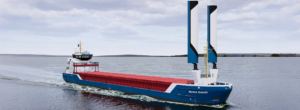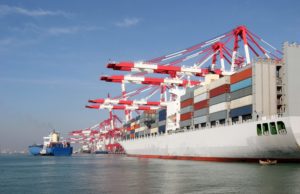The global shipping industry can reduce emissions by nearly 50% by the end of the decade without impacting trade, a new study finds, ahead of key United Nations decision to reduce greenhouse gas emissions from ships.
The study from CE Delft shows that ships can achieve 36-47% emissions reduction by 2030 compared to 2008 levels by deploying 5-10% zero or near-zero emission fuels, wind-assist technologies, and by ‘climate optimising’ the speed of ships.
The study also concludes that costs associated with these emissions cuts would be manageable.
According to the new analysis, halving emissions in this decade would only add around 10% to the total cost of shipping operations, a sum that would be dwarfed by the cost of climate related damages to the industry and wider society if shipping fails to cut emissions.
These findings come as the United Nations International Maritime Organization (IMO) is about to reach an agreement on climate targets to reduce greenhouse gas emissions from ships in July.
Civil society groups call on the IMO’s 175 member states to urgently support halving shipping emissions by 2030 and reaching zero by 2040.
The IMO is in the process of revising its existing climate targets, which currently aim to only halve emissions from ships by 2050.
The negotiations are set to continue on 26-30 June with an Intersessional Working Group meeting, before concluding on 3-7 July at the 80th session of the Marine Environment Protection Committee meeting (MEPC 80).
It’s worth noting that zero emissions by 2040 is already the goal of Maersk, the world’s 2nd largest container shipping line, who are confident this date is technologically possible and practical.
Many of the world’s biggest buyers of maritime freight, including Amazon, IKEA and Unilever, have also committed to progressively switching all their cargo bookings over to zero-emission ships to reach 100% by 2040.
Faïg Abbasov, Transport & Environment, said: ”Waiting until 2050 to decarbonise is a bit like waiting until your house burns down before you call the fire brigade. This would be irresponsible and disingenuous. Science says halving emissions by 2030 is technically possible, and costs are manageable. What is needed is the political will. IMO needs to either step up or ship out!”.
John Maggs, Seas At Risk, commented: ”The science is crystal clear, emissions from shipping have to halve by 2030 if we are to stand any chance of keeping warming below the Paris Agreement’s 1.5°C temperature limit. What was less clear until now was if this is possible without impacting trade. Now we know not only that it is possible and shipping has a clear pathway to halving its climate impact by 2030, but that it can do so at minimal cost.”



